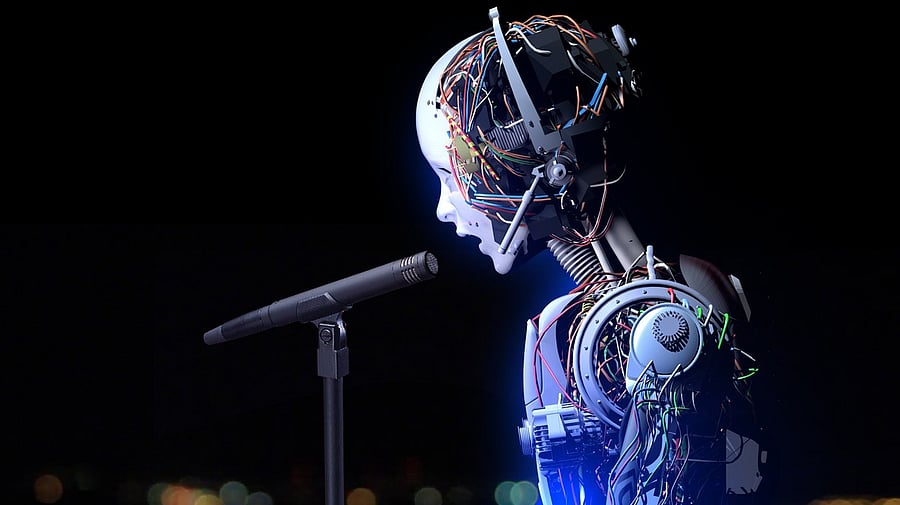
Image for representation.
Credit: iStock Photo
The intersection of artificial intelligence (AI) and copyright law in the Indian music industry presents a complex and evolving landscape, raising critical questions about ownership, creativity, and the future of music production.
As AI technologies grow increasingly sophisticated, they are not only transforming how music is created but also challenging the traditional paradigms of copyright that have long governed the industry. The implications of AI-generated music are profound, necessitating a re-evaluation of existing legal frameworks to ensure they adequately protect the rights of all stakeholders involved, from artists to producers. Central to this discussion is the issue of authorship.
Indian copyright law, established under the Copyright Act of 1957, does not explicitly recognise AI as a creator. This omission creates ambiguity regarding who holds the rights to music produced by AI systems. Traditionally, copyright law attributes ownership to human creators—musicians, lyricists, and composers—who invest their creativity into their works.
However, when an AI system autonomously generates a piece of music or assists in its composition, it raises the question: who is the rightful owner? Is it the programmer who developed the AI, the user who prompted its creation, or does the AI itself hold any claim? These questions highlight a critical gap in India’s intellectual property framework that must be addressed to keep pace with technological advancements.
Recent legal battles underscore these challenges. For instance, major record labels such as Sony Music and Universal Music Group have initiated lawsuits against AI companies for alleged copyright infringement. They argue that these companies have used copyrighted music without authorisation to train their AI models, which then produce new compositions that could potentially compete with human-created music. The outcomes of these cases will likely set important precedents for how copyright law applies to AI-generated works and could reshape the relationship between human artists and technology in the creative process.
Moreover, as AI continues to evolve, it is essential to consider how it influences listeners’ preferences and consumption patterns. The rise of AI-generated music could lead to a homogenisation of musical styles if not managed properly.
While AI can produce high-quality music quickly and efficiently, there is a risk that it may prioritise formulaic compositions over innovative artistry. This potential shift could diminish the diversity that characterises the Indian music industry, which has thrived on a rich tapestry of cultural influences and individual expression.
The ethical implications surrounding AI in music creation also warrant attention. As AI systems learn from vast datasets comprising existing musical works, there is a fine line between inspiration and infringement. The use of pre-existing compositions as training data raises concerns about whether AI-generated music can truly be considered original or if it merely replicates existing styles and ideas. Establishing clear criteria for originality within this context is crucial for ensuring that artists’ rights are protected while fostering an environment conducive to innovation. In addressing these challenges, India must embark on comprehensive reforms of its intellectual property laws.
A two-pronged approach is necessary: first, adapting existing frameworks to encompass the unique role of AI in creative processes; second, establishing regulations that clearly define copyright ownership for AI-generated content. Such reforms should aim to balance the interests of creators with those of technology developers while promoting a vibrant and sustainable creative ecosystem. Furthermore, there is an urgent need for dialogue among stakeholders in the music industry to collaboratively develop solutions that address these complexities. Initiatives like RightsAndAI.com represent steps toward creating awareness and advocating for compliance with copyright regulations among AI companies. By fostering collaboration between human creativity and technological advancement, India can position itself as a leader in navigating the challenges posed by AI in music while ensuring that creators are fairly compensated for their contributions.
As technology continues to reshape creative landscapes, it is imperative that legal frameworks evolve accordingly to protect artists’ rights while embracing innovation. By proactively addressing these issues through comprehensive reforms and collaborative efforts among stakeholders, India can cultivate an environment where both human artistry and technological advancement coexist harmoniously—ultimately enriching its vibrant musical heritage.
(Deevanshu Shrivastava is associate dean, and Shreya Goswami is assistant professor at School of Law, GD Goenka University, Gurugram)